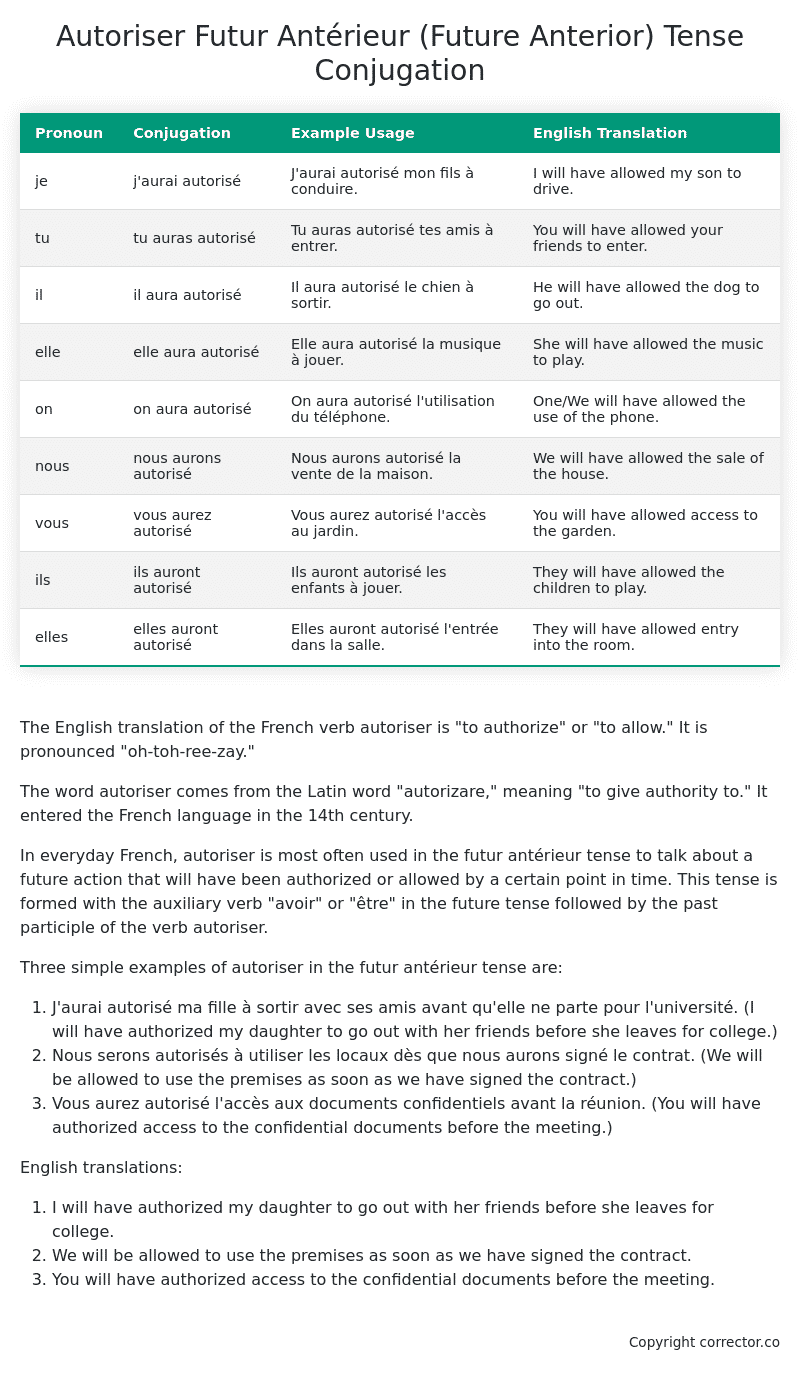Futur Antérieur (Future Anterior) Tense Conjugation of the French Verb autoriser
Introduction to the verb autoriser
The English translation of the French verb autoriser is “to authorize” or “to allow.” It is pronounced “oh-toh-ree-zay.”
The word autoriser comes from the Latin word “autorizare,” meaning “to give authority to.” It entered the French language in the 14th century.
In everyday French, autoriser is most often used in the futur antérieur tense to talk about a future action that will have been authorized or allowed by a certain point in time. This tense is formed with the auxiliary verb “avoir” or “être” in the future tense followed by the past participle of the verb autoriser.
Three simple examples of autoriser in the futur antérieur tense are:
- J’aurai autorisé ma fille à sortir avec ses amis avant qu’elle ne parte pour l’université. (I will have authorized my daughter to go out with her friends before she leaves for college.)
- Nous serons autorisés à utiliser les locaux dès que nous aurons signé le contrat. (We will be allowed to use the premises as soon as we have signed the contract.)
- Vous aurez autorisé l’accès aux documents confidentiels avant la réunion. (You will have authorized access to the confidential documents before the meeting.)
English translations:
- I will have authorized my daughter to go out with her friends before she leaves for college.
- We will be allowed to use the premises as soon as we have signed the contract.
- You will have authorized access to the confidential documents before the meeting.
Table of the Futur Antérieur (Future Anterior) Tense Conjugation of autoriser
| Pronoun | Conjugation | Example Usage | English Translation |
|---|---|---|---|
| je | j’aurai autorisé | J’aurai autorisé mon fils à conduire. | I will have allowed my son to drive. |
| tu | tu auras autorisé | Tu auras autorisé tes amis à entrer. | You will have allowed your friends to enter. |
| il | il aura autorisé | Il aura autorisé le chien à sortir. | He will have allowed the dog to go out. |
| elle | elle aura autorisé | Elle aura autorisé la musique à jouer. | She will have allowed the music to play. |
| on | on aura autorisé | On aura autorisé l’utilisation du téléphone. | One/We will have allowed the use of the phone. |
| nous | nous aurons autorisé | Nous aurons autorisé la vente de la maison. | We will have allowed the sale of the house. |
| vous | vous aurez autorisé | Vous aurez autorisé l’accès au jardin. | You will have allowed access to the garden. |
| ils | ils auront autorisé | Ils auront autorisé les enfants à jouer. | They will have allowed the children to play. |
| elles | elles auront autorisé | Elles auront autorisé l’entrée dans la salle. | They will have allowed entry into the room. |
Other Conjugations for Autoriser.
Le Present (Present Tense) Conjugation of the French Verb autoriser
Imparfait (Imperfect) Tense Conjugation of the French Verb autoriser
Passé Simple (Simple Past) Tense Conjugation of the French Verb autoriser
Passé Composé (Present Perfect) Tense Conjugation of the French Verb autoriser
Futur Simple (Simple Future) Tense Conjugation of the French Verb autoriser
Futur Proche (Near Future) Tense Conjugation of the French Verb autoriser
Plus-que-parfait (Pluperfect) Tense Conjugation of the French Verb autoriser
Passé Antérieur (Past Anterior) Tense Conjugation of the French Verb autoriser
Futur Antérieur (Future Anterior) Tense Conjugation of the French Verb autoriser (this article)
Subjonctif Présent (Subjunctive Present) Tense Conjugation of the French Verb autoriser
Subjonctif Passé (Subjunctive Past) Tense Conjugation of the French Verb autoriser
Subjonctif Imparfait (Subjunctive Imperfect) Tense Conjugation of the French Verb autoriser
Subjonctif Plus-que-parfait (Subjunctive Pluperfect) Tense Conjugation of the French Verb autoriser
Conditionnel Présent (Conditional Present) Tense Conjugation of the French Verb autoriser
Conditionnel Passé (Conditional Past) Tense Conjugation of the French Verb autoriser
L’impératif Présent (Imperative Present) Tense Conjugation of the French Verb autoriser
L’infinitif Présent (Infinitive Present) Tense Conjugation of the French Verb autoriser
Struggling with French verbs or the language in general? Why not use our free French Grammar Checker – no registration required!
Get a FREE Download Study Sheet of this Conjugation 🔥
Simply right click the image below, click “save image” and get your free reference for the autoriser Futur Antérieur tense conjugation!

Autoriser – About the French Futur Antérieur (Future Anterior) Tense
Construction
Common Everyday Usage Patterns
Interactions with Other Tenses
For example
Summary
I hope you enjoyed this article on the verb autoriser. Still in a learning mood? Check out another TOTALLY random French verb conjugation!


